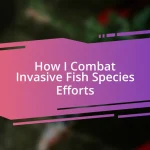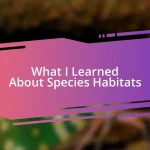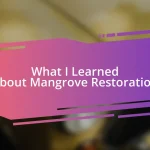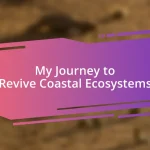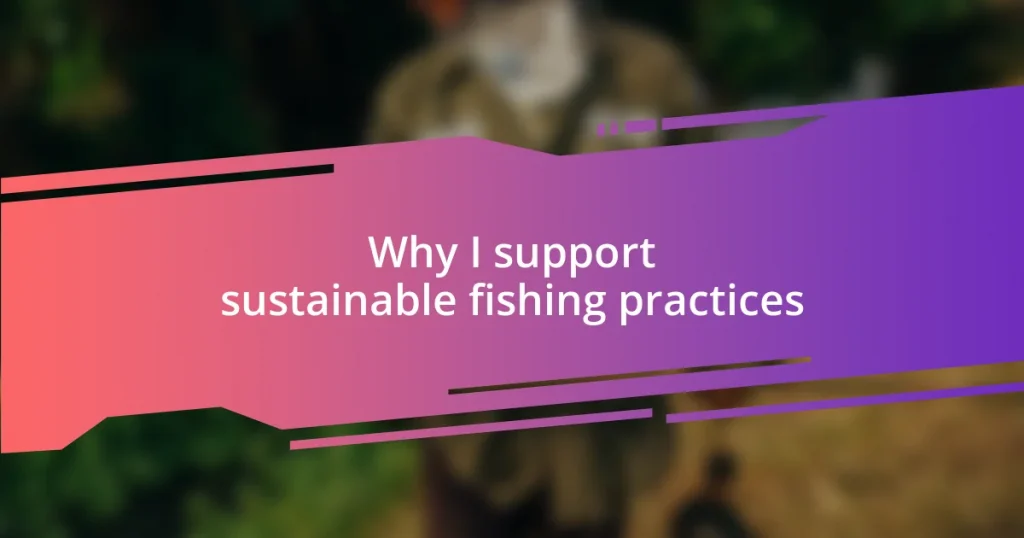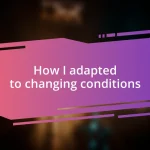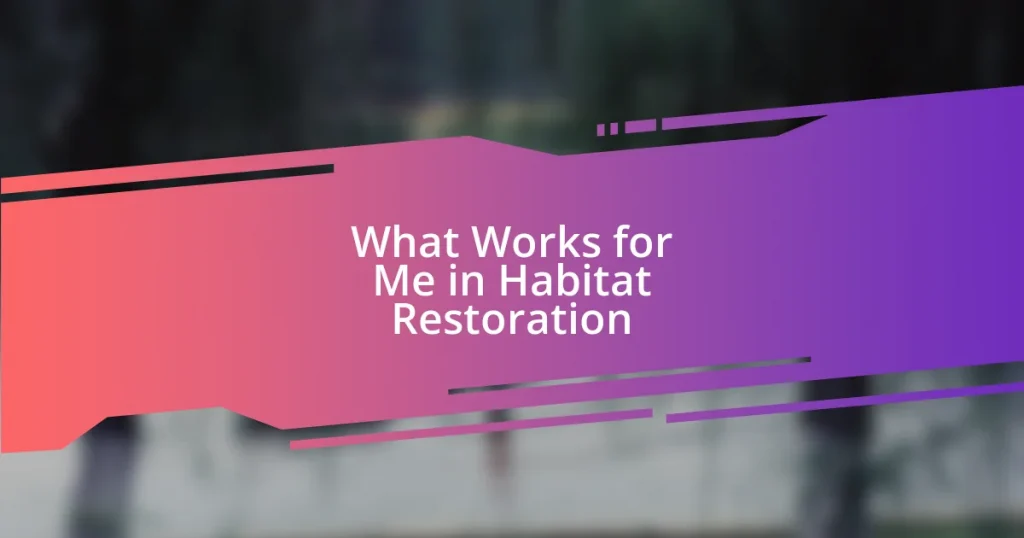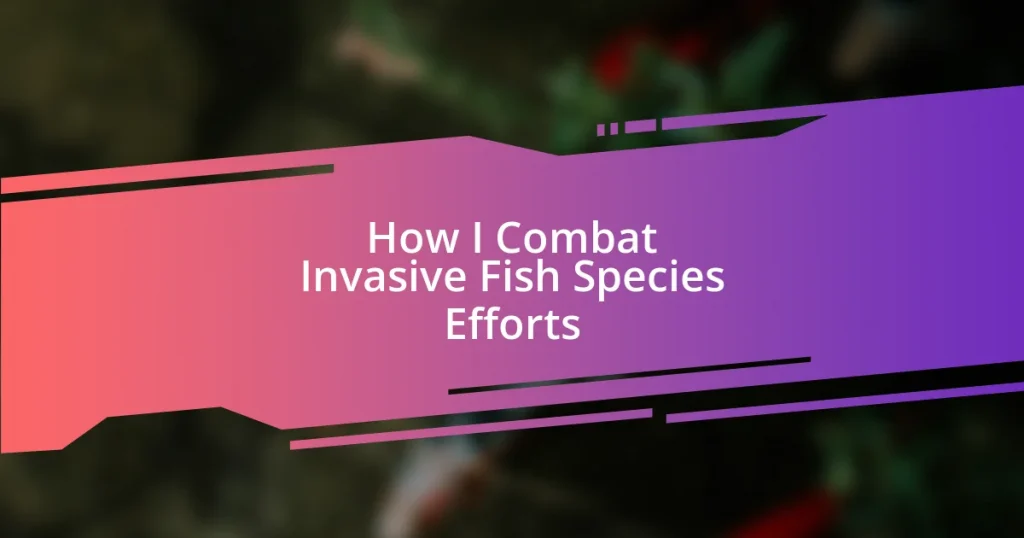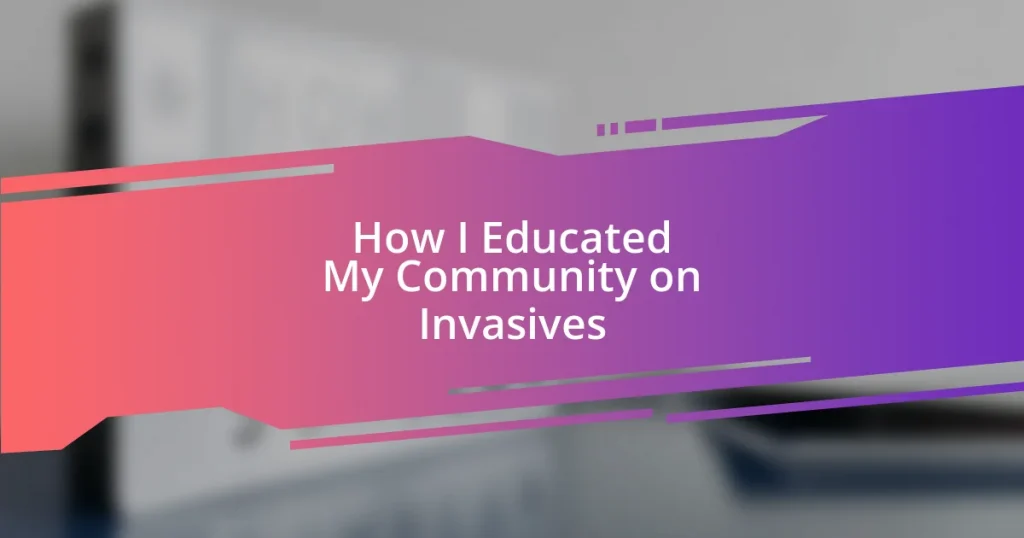Key takeaways:
- Sustainable fishing practices enhance ocean health, support local communities, and provide healthier seafood options.
- Overfishing leads to economic decline, biodiversity loss, and disruption of marine ecosystems, threatening the future of fishing communities.
- Advocacy for sustainable policies, community involvement, and personal actions can significantly promote sustainable fishing and protect marine resources.
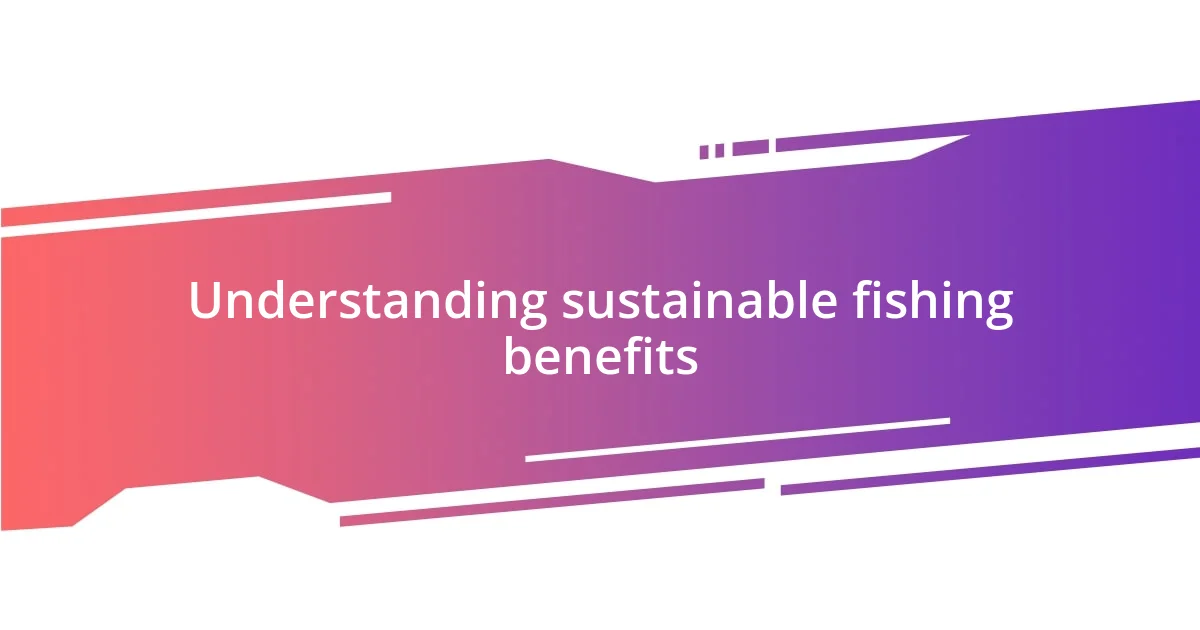
Understanding sustainable fishing benefits
Sustainable fishing practices offer a wealth of benefits that extend beyond just preserving fish populations. I remember a trip to a local fish market where I came across a stall promoting sustainably sourced seafood. The pride in the vendor’s voice was palpable as he explained how these practices not only protect fish habitats but also ensure we can enjoy seafood for generations to come. Isn’t it comforting to think that our choices directly contribute to a healthier ocean ecosystem?
Moreover, sustainable fishing supports the livelihoods of coastal communities. I recently spoke with a fisherman who had switched to sustainable methods, and he shared how it transformed his business. He no longer worries about overfishing; instead, he focuses on long-term viability. Can you imagine the relief of knowing that your day-to-day work is contributing to both your community and the environment?
Finally, consider the health benefits of opting for sustainably sourced fish. Eating fish that come from well-managed ecosystems means we’re consuming fresher, toxin-free options. I often think back to a meal I had featuring sustainably caught salmon—it tasted incredible and left me feeling good inside, knowing I was making a positive impact. How often do we get to enjoy something delicious while supporting a cause we care about?
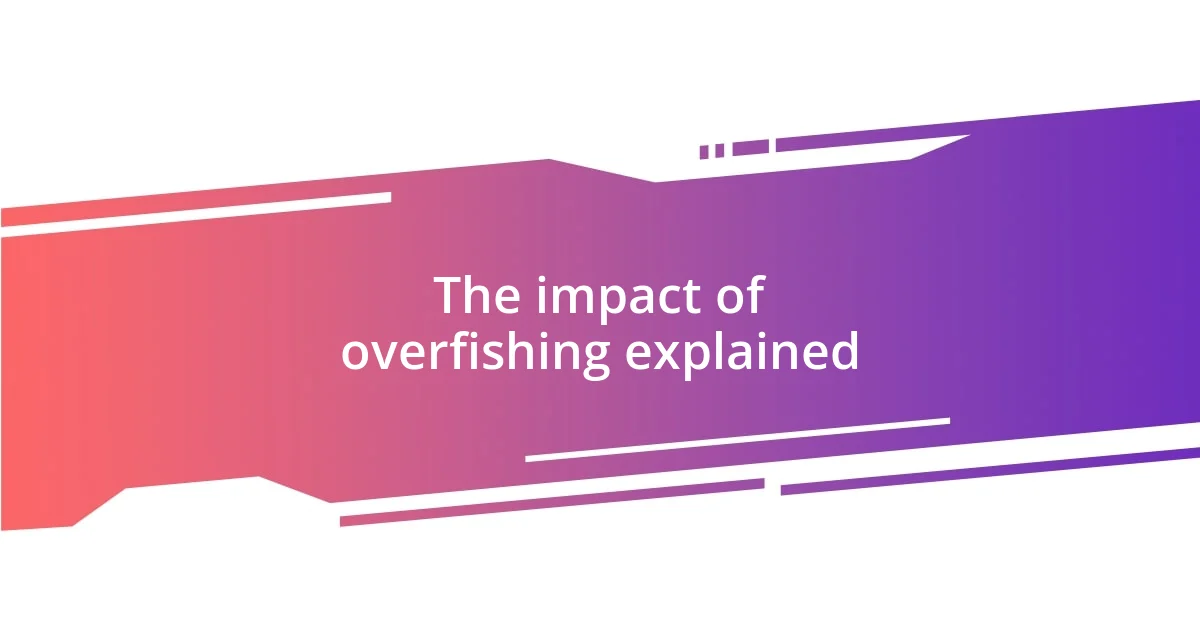
The impact of overfishing explained
The consequences of overfishing are far-reaching and often devastating. I vividly recall standing on a bustling shoreline where fishermen once thrived, only to hear from locals how their catch has diminished drastically over the years. It’s heartbreaking to see communities that once celebrated bountiful harvests now struggling to find enough fish to sustain their families. How can we let this happen?
As stocks deplete, the delicate balance of marine ecosystems is disrupted, leading to a decline in biodiversity. One day, while diving in a marine reserve, I was captivated by the vibrant life teeming below. It was like witnessing the ocean at its finest. Yet, I couldn’t help but think about how overfishing threatens such beauty. These ecosystems need protection, and the loss of diverse species affects not just the fish but also the overall health of our oceans.
Overfishing doesn’t just hurt the fish populations; it ripples through the entire food chain. I remember reading about how the decline of predator fish led to an explosion in smaller fish populations, which in turn disrupted the habitat. Reflecting on this makes me realize how interconnected everything is. Our choices in fishing practices directly influence not only what we consume but also the health of the oceans and future generations’ ability to do the same.
| Impact | Description |
|---|---|
| Economic Decline | Communities reliant on fishing face income loss. |
| Loss of Biodiversity | Reduced species leads to unbalanced ecosystems. |
| Food Chain Disruption | Overfishing alters predator-prey relationships. |
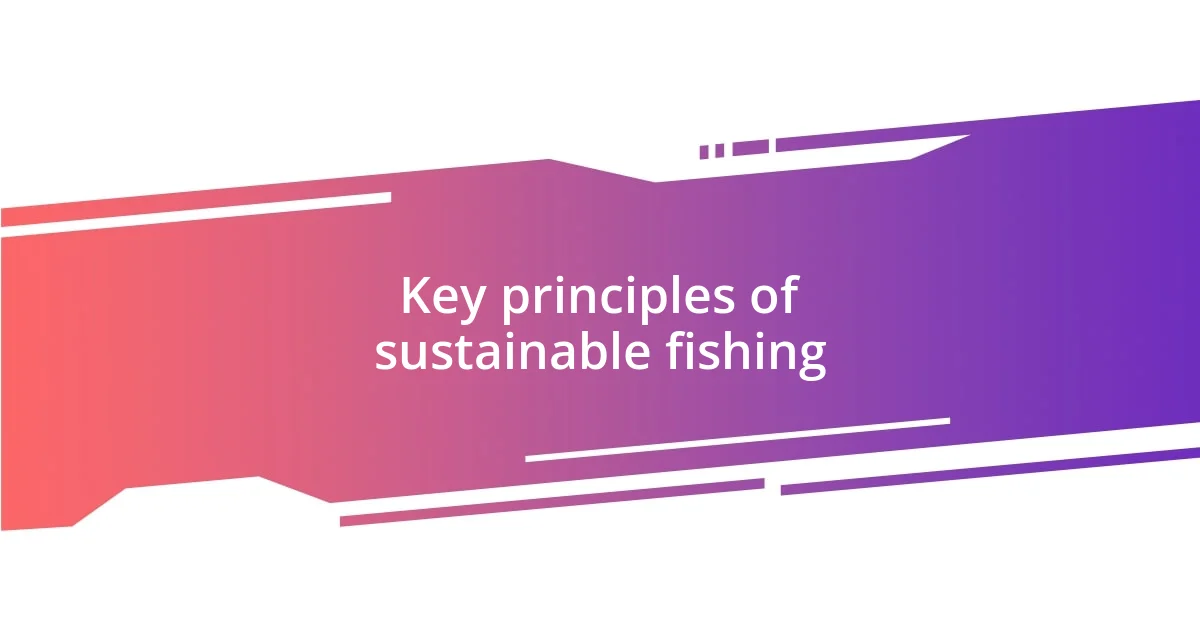
Key principles of sustainable fishing
Key principles of sustainable fishing
At the heart of sustainable fishing are principles that guide us toward healthier oceans and thriving communities. I remember a workshop where a marine biologist shared the importance of catch limits. It struck me how these regulations help maintain fish populations and foster resilience in marine ecosystems. By respecting these limits, we not only preserve our current resources but also protect them for future generations. Just think of it as setting boundaries for a balanced relationship with our ocean friends.
- Catch Limits: These ensure that fish populations are maintained at sustainable levels, allowing them to reproduce and thrive.
- Bycatch Reduction: Utilizing techniques that minimize the unintended catch of non-target species helps protect marine biodiversity.
- Habitat Protection: Sustainable practices involve safeguarding critical habitats, like breeding and nursery grounds, to support the life cycles of various fish species.
- Community Involvement: Engaging local communities in sustainability efforts promotes stewardship and ensures that fishing practices align with cultural and economic needs.
I once spoke with a community leader whose initiative focused on sustainable fishing education. The passion in her voice made me realize how empowering fishermen with knowledge transforms their practices. It’s fascinating how small changes, like using specific gear to reduce bycatch, can lead to significant benefits for both fish and fishers alike. This principle not only fosters responsibility toward the sea but builds a brighter future for coastal economies, allowing communities to thrive sustainably.
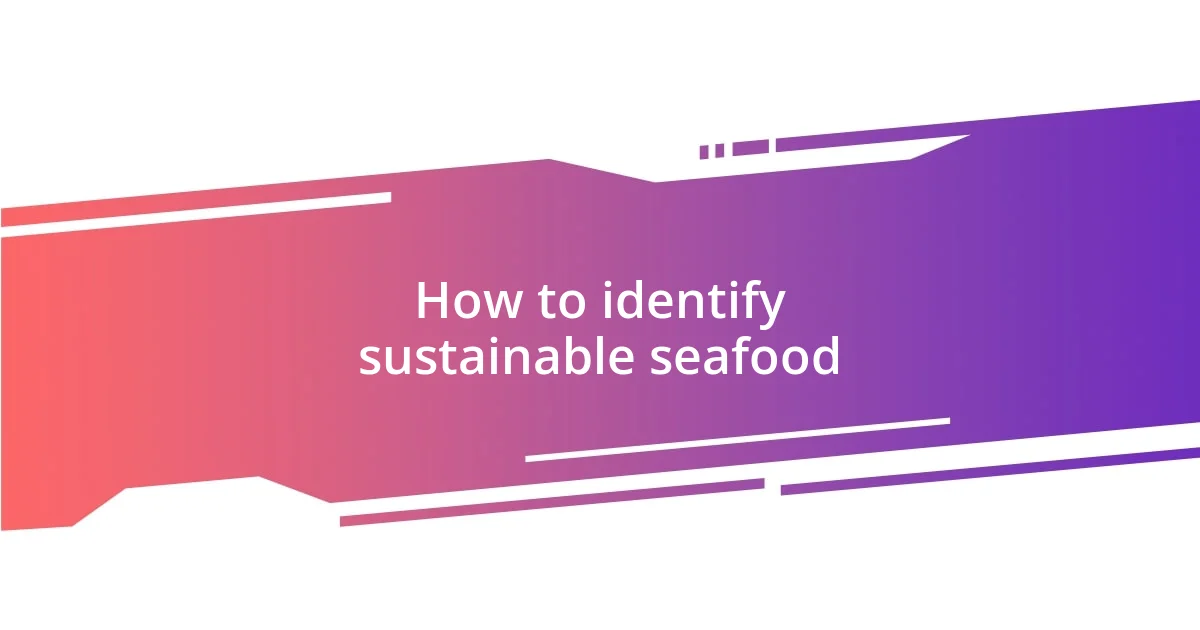
How to identify sustainable seafood
When it comes to identifying sustainable seafood, labels play a crucial role. I often find myself scrutinizing packaging for certifications like the Marine Stewardship Council (MSC) label, which guarantees that the seafood comes from well-managed fisheries. It’s like having a trustworthy friend guide you through the endless seafood options in the store.
Another useful approach is to ask questions. I remember asking my local fishmonger where the fish was sourced. The enthusiasm in his voice when he spoke about his suppliers made me feel confident in my choices. When sellers can provide detailed answers about their fishing practices and the sustainability of their catch, it’s a good sign that they’re dedicated to responsible fishing.
Moreover, seasonal availability can offer insights into sustainability. Some seafood is simply not available at certain times of the year, which means it’s likely that the fish populations are being allowed to recover. I always take note of seasonal fishing guides; following these not only supports healthier ecosystems but also ensures I’m enjoying the freshest seafood possible. Doesn’t that just feel right?
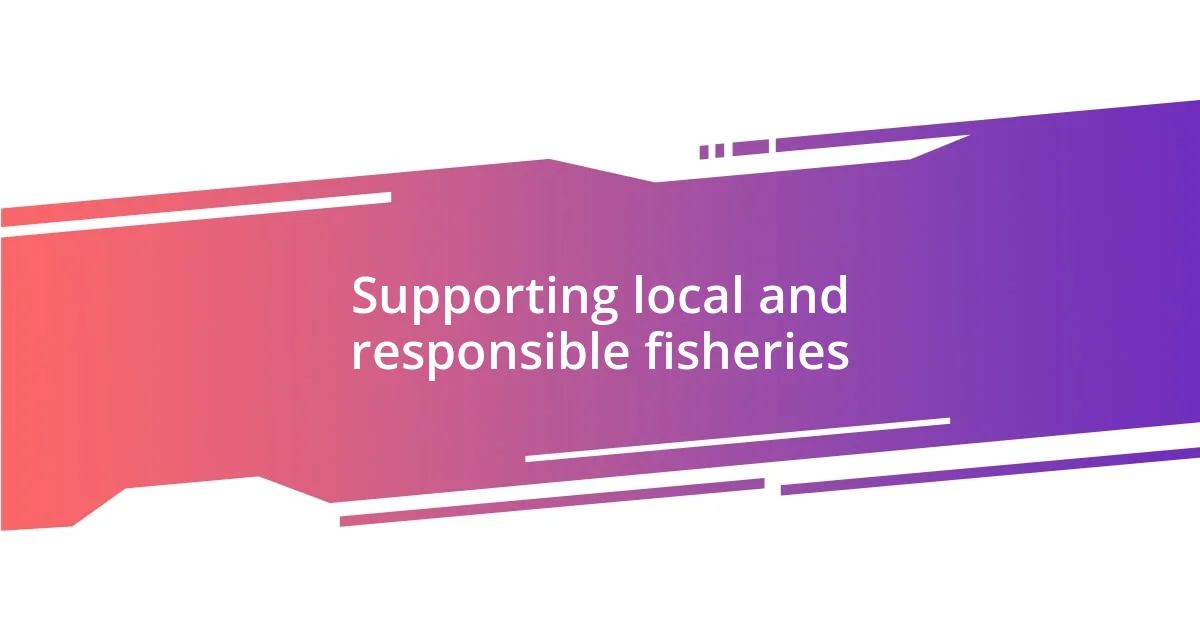
Supporting local and responsible fisheries
Supporting local fisheries is not just about sustainability; it’s about community. Recently, I visited a small coastal town where fishing is a way of life. As I explored the local fish market, I felt the palpable pride from fishermen who’d spent their lives in these waters. They weren’t just selling fish; they were sharing a legacy, one that respects the ocean and nurtures their culture.
My conversations with these local fishers really opened my eyes. They spoke passionately about their commitment to responsible fishing practices. It was clear that their livelihoods depended on healthy fish populations, and they understood the delicate balance required to maintain that. Isn’t it inspiring how these individuals often embrace sustainable practices not just for profit but for the preservation of their environment and community identity?
I also reflect on a time I participated in a local fishery clean-up event. The energy of everyone—families, volunteers, and fishermen alike—was contagious. We weren’t merely cleaning up the beaches; we were building relationships. This kind of community involvement is so vital. It fosters a sense of ownership over the resources we depend on. When local fisheries thrive, it’s a win-win situation for the environment and the economy. How often do we think about the direct impact our food choices have on these small communities? Each decision can support these responsible fishing practices and ultimately lead to healthier oceans.
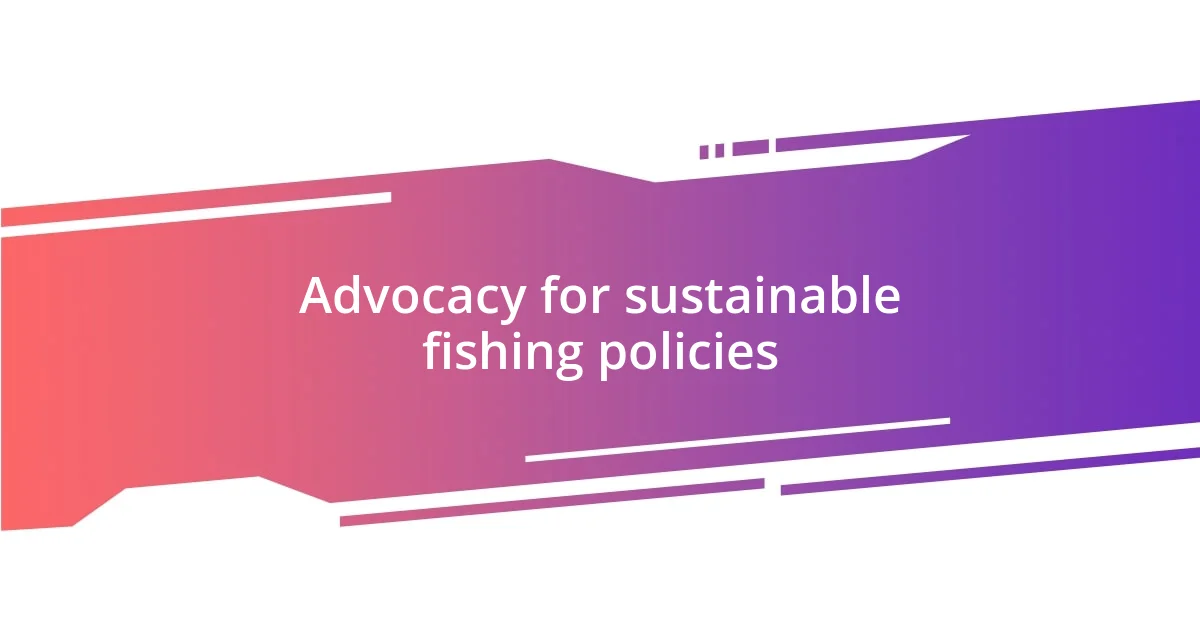
Advocacy for sustainable fishing policies
Advocating for sustainable fishing policies is not just about environmental concerns; it’s about safeguarding our future. When I think about the countless times I’ve enjoyed a seafood meal, I can’t help but wonder how much healthier our oceans could be with stronger policies in place. The government plays a crucial role in regulating fishing quotas and protecting marine habitats. I often feel there’s so much more we can do to push for rigorous enforcement of these regulations.
In my discussions with fellow advocates, I’ve noticed a shared frustration when policies seem to favor industrial fishing over small-scale fishers. During a recent community meeting, a local fisherman shared how government subsidies often overlook those who genuinely practice sustainable methods. I felt a mix of hope and urgency in the air as we brainstormed ways to amplify our voices and influence policy changes that reflect the needs of our communities instead of just corporate interests. Isn’t it essential that we advocate for frameworks that support those who care deeply about our oceans?
I’ve also seen the power of grassroots movements in bringing about change. One memorable moment was when I joined a petition drive advocating for better fishing regulations in our region. The energy among us was electric, and each signature we collected felt like a small victory. It reminded me that change starts at the community level and that we all have a part to play in shaping the policies that will protect our precious marine resources. Isn’t that empowering? By advocating together, we can make a significant impact on sustainable fishing practices.
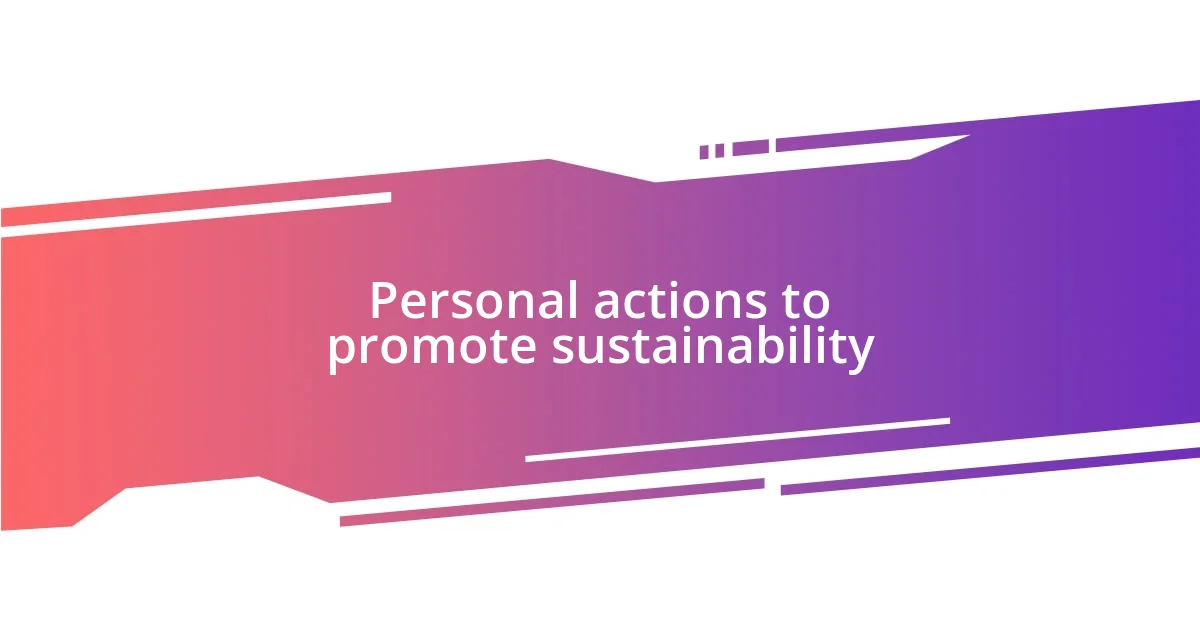
Personal actions to promote sustainability
Personal actions to promote sustainability can be surprisingly impactful. I remember attending a community workshop on sustainable fishing where I learned about the importance of choosing seafood that’s certified by organizations like the Marine Stewardship Council. It’s a simple step, yet armed with that knowledge, I’ve shifted my buying habits. Each time I reach for a sustainable label, I can’t help but think about the ripple effect my choices create. How can something as mundane as grocery shopping lead to a healthier ocean?
One of my favorite actions is sharing what I know with friends and family. The last time I hosted a dinner party, I prepared a lovely seafood dish and made sure to explain why I sourced the ingredients responsibly. Watching their surprise turn into enthusiasm was a pivotal moment for me. We often underestimate the power of conversation, don’t we? It reminded me that if we all take small steps to inform others, we can build a community that’s more knowledgeable about sustainable practices.
I also try to minimize my plastic consumption, understanding that it inevitably ends up in our oceans, harming marine life. It’s a bit of a daily challenge to remember my reusable bags and straws, but I’ve found that each little choice builds up over time. Recently, I joined a local initiative that organizes monthly clean-ups by the beaches. Each time I see a beach free of litter, I feel a deep sense of accomplishment that transcends my individual contributions—it’s about creating a healthier ecosystem. Isn’t it fulfilling to feel like you’re part of something bigger?

